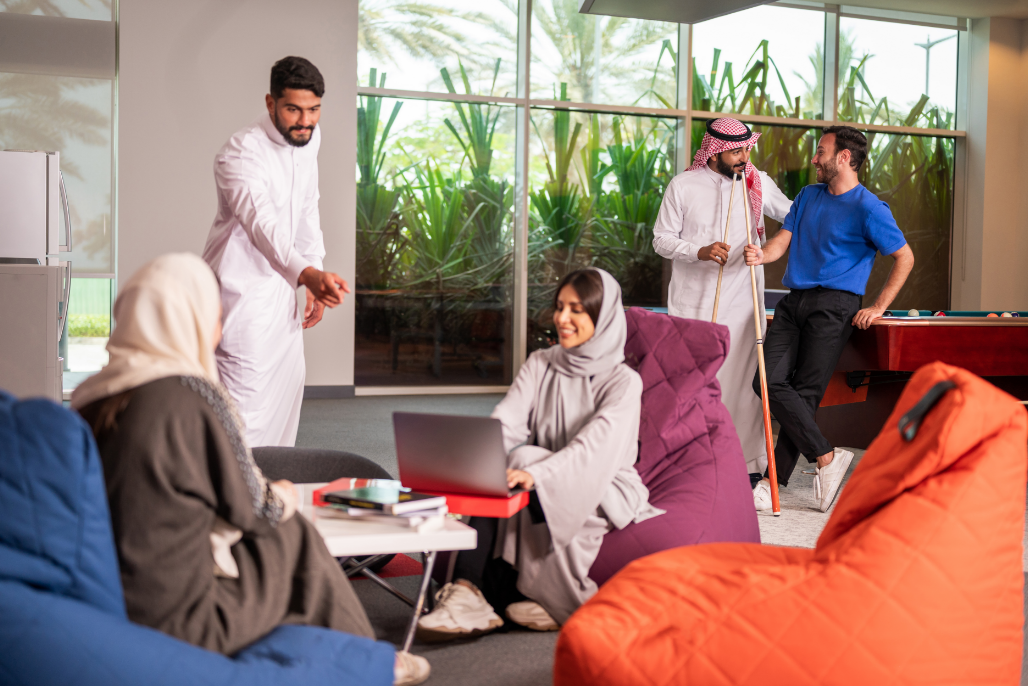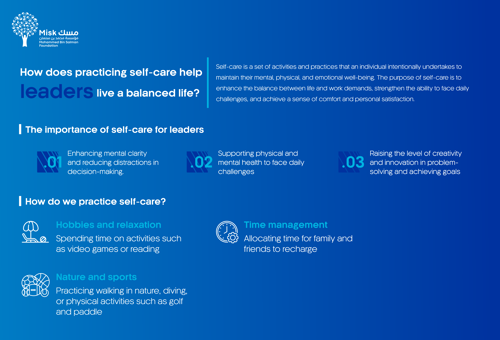
In a world filled with rapid changes and unexpected challenges, most leaders and entrepreneurs often face daily pressures that require them to make critical decisions or deal with unforeseen obstacles and adapt to continuous market fluctuations. With the abundance of these challenges and changes, practicing self-care becomes not just a luxury or leisure activity, but a necessity for building a balanced and effective leader capable of maintaining focus, managing emotions, and acting with wisdom and intelligence in various situations.
Leaders who prioritize their physical and mental well-being possess a higher ability to sustain their efforts and have a positive influence on their surroundings. In this context, we will explore the importance of self-care for leaders and how it can be a catalyst for success and sustainable productivity.
Self-Care: What Does It Mean for a Leader?
Self-care for leaders encompasses various aspects, ranging from physical health practices such as exercise and a balanced diet, to mental well-being through different approaches and applications like spiritual connection, meditation, deep thinking, and more. These practices enable leaders to be better prepared to handle daily challenges with high efficiency and clarity and increase their readiness to make sound and balanced decisions.
Self-care is crucial for leaders for several reasons:
How can leaders practice self-care?
Amidst the multitude of tasks and responsibilities that fall under a leader's purview, the need to prioritize mental and physical well-being becomes paramount to sustain optimal performance and achieve personal balance. While practices of self-care may vary from one individual to another, this list outlines some strategies that can benefit everyone by combining time management, priority setting, and enabling leaders to tackle challenges with a renewed sense of Vigor and energy.
Leaders can allocate daily or weekly time slots dedicated to personal interests, such as exercising, meditation, reading, or other pursuits. This scheduling goes beyond mere time management; it's an investment in mental respite, allowing these activities to replenish energy and enthusiasm for work. Consistently engaging in such practices enhances mental and physical health.
Sleep is the fundamental factor in promoting mental and physical performance. It improves focus, boosts memory, strengthens the immune system, and enhances creative thinking abilities. Well-rested leaders are better equipped to engage with their work environment at their best. Those who recognize the importance of quality sleep often find themselves more capable of navigating challenges and making decisive decisions without hesitation.
Taking periodic breaks from work is a necessary respite that recharges one's energy. These pauses allow for quiet reflection and self-evaluation, preventing burnout that can adversely impact efficiency. Regular breaks enhance concentration and reduce the likelihood of feeling stressed or distracted, enabling leaders to think more clearly and make well-considered decisions, free from constant pressures.
Strong social relationships serve as vital sources of emotional support and stress relief from work or life pressures. Family and friendships provide an escape from the challenges of the work environment, offering leaders an opportunity to unwind and express themselves authentically. This social interaction alleviates feelings of isolation that leaders may sometimes experience and contributes to boosting morale and improving their mental well-being.
Overall, leveraging free time positively is one of the cornerstones of leadership success and sustained productivity. Leadership demands substantial energy, continuous focus, and the ability to make sound decisions amidst various work pressures.

In this context, His Royal Highness Prince Mohammed bin Salman shared insights into his approach to utilizing leisure time during an interview with Fox News, highlighting activities that promote relaxation and renew his vitality. He mentioned, "I play some video games with my children or friends, and I enjoy scuba diving and hiking in the mountains." Each of these pursuits reflects a profound understanding of the importance of dedicating time away from work pressures and indulging in activities that nourish the soul and recharge energy.
When leaders engage in activities that rejuvenate their energy, they return to their offices with minds brimming with new ideas and visions. The social connection aspect provided by leisure time cannot be overlooked; playing with friends or children reinforces human bonds and makes leaders more relatable and understanding of their personal environments, positively impacting how they interact with their teams. Striking a balance between personal and professional life, and knowing when to pause and enjoy the moment, are essential elements of sustainable leadership.
Ultimately, a leader who enjoys balanced physical and mental well-being is better equipped to achieve success and longevity. Investing in oneself grants leaders the ability to handle stress effectively, the wisdom to navigate challenges adeptly, and enables them to give their best to their work and teams, ensuring sustained high performance over the long term.